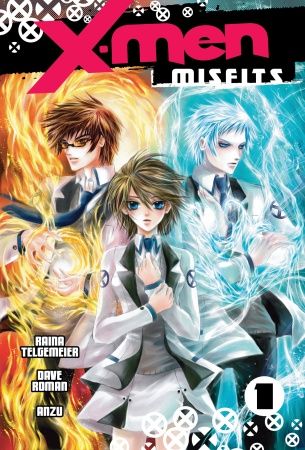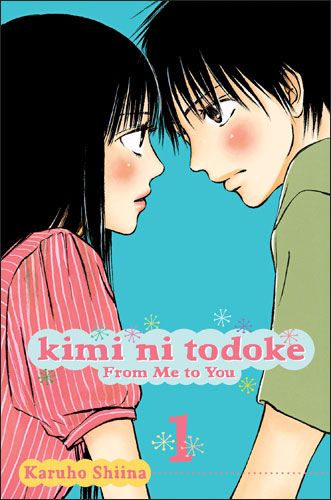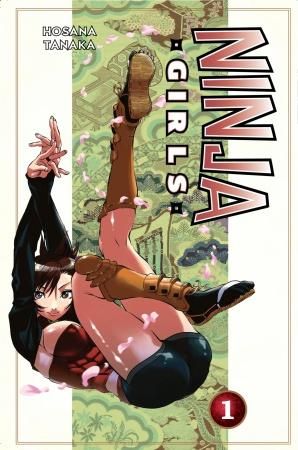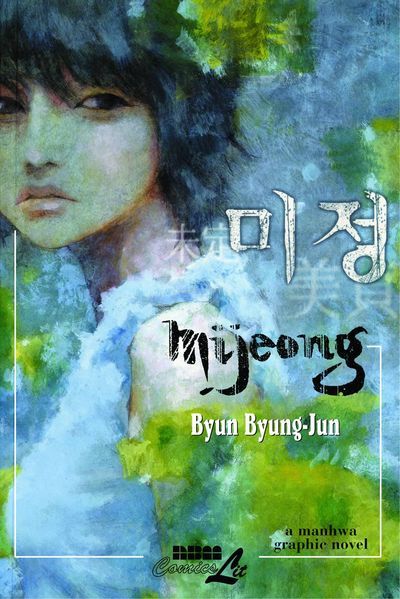Story by Raina Telgemeier and Dave Roman. Art by Anzu
Del Rey, 192 pages, $12.99.
Grafting the X-Men onto a shojo manga template isn't a half-bad idea, considering the soap opera antics of the series back in its heyday (and indeed, even today). The problem lies in that Telgemeier and Roman have grafted too much of the template onto this comic, so that none of the characters have any room to move beyond their narrowly defined roles. It's way too slavish to shojo cliches -- Anzu apparently never met a chibi she didn't like. There's some amusement in seeing Angel gussied-up Bishonen style or Beast looking like Totoro's second cousin, once removed, to be sure. But its adherence to shallow formula is just as bad as the dull exposition and fight scenes that make up most modern X-Men comics. Too bad. I was really hoping for something that blended the best aspects of both Western and Eastern comics, not something that swapped out one set of cliches for another.
Kimi Ni Todoke: From Me to You Vol. 1
by Karuho Shiina
Viz, 216 pages, $8.99.
After I left high school, one of my friends in the lower grades told me that because he wore a black trench coat (this was pre-Columbine) and kept mostly to himself, people started a rumor that he was a vampire. Not in some sort of joking way either. They seriously thought he was into some kind of blood-sucking, black-magic shit, even though the only evidence they had to base that on was the fact that he glowered a lot.
That being the case, it doesn't seem too far-fetched to me that the heroine of this shojo manga, Sawako Kuronuma, would be ostracized by her peers merely because she looks a lot like that creepy girl from The Ring. The fact that she's socially awkward doesn't help much either.
You can probably figure out where things go from here. There's a cute boy who's popular and takes an interest in Sawako, which leads to her coming out of her shell, but plot contrivances and mean people strive to keep them apart. Overall it was enjoyable enough as these sorts of things go, though I wonder how long author Shiina can maintain the characters' varying levels of credulity without straining the readers incredulity. After all, even the students at my school eventually figured out my friend was harmless and moved onto slandering someone else.
Four-Eyed Prince Vol. 1
by Watarau Mizukami
Del Rey, 192 pages, $10.99.
Where are all the parents in these shojo manga? What are they doing while their kids are off gallivanting around and making puppy eyes at each other? Why do they allow their teen-agers to live by themselves? Why do so many of them die in mysterious car accidents? Why are they never around?
OK, I know the reason. It's because if they were, they'd say things like "Sachiko, I forbid you to want to date your stepbrother even though you aren't related since a) you're both living together under the same roof; and b) he's kind of got a multiple-personality disorder, what with the whole glasses on he's cold and distant and glasses off he's warm and vulnerable thing."
Actually, now that I think of it, having the mom be the impediment to love would have made for a much more interesting manga than whatever's going on here.
Ninja Girls Vol. 1
by Hosana Tanaka
Del Rey, 208 pages, $10.99.
Saaaaaayyyyyy, all these action scenes featuring cute and extremely buxom girls in short-shorts protecting the personality-deprived male protagonist from equally buxom villains wouldn't be some sort of pandering, sexist and embarrassingly shallow excuse for fan service, would it?
Why, yes. Yes, it would.
by Byun Byung-Jun
NBM, 240 pages, $19.99
Byung-Jun's dappled, detailed art work is lovely to look at, but his stories, mostly involving sullen youths for whom heartbreak or something worse has left them emotionless and hollow, come off as hopelessly contrived and stilted. The first story, involving an abused young girl and an older, despondent man, works well enough, but most of the others come to their conclusions in awkward, ham-fisted fashion. There's no real reason, for instance, for the classmates in the story "Utility" to be so utterly blasé about the death they witness, other than it suits the author's purposes. Without a grounding in some sort of emotional reality, it's hard for me to connect or care about these characters. It's all very heart-on-sleeve, overly earnest, emo sort of manhwa, and honestly, my patience for that sort of thing is very minimal these days. In some ways, this is just as contrived as Ninja Girls, but at least the latter is more honest about its intentions.






